#it’s like third person outside narrator written very like formally?
Text
this novel my grandma has me reading is so immeasurably difficult to read and comprehend i’m dying
#like the story itself would be interesting if it weren’t for the writing style#i’m struggling so much#it’s like third person outside narrator written very like formally?#i struggle with formal prose so much it just reads like shakespeare to me and i cant focus#thank god it’s not super long it’s only 210 pages#i’m on page 94 and i already politely asked if we could switch books#she said no because she thought the book applies to my dream job field 😭#she wants me to analyze it through a criminal psychologist’s lens and determine if he deserves jail or whatever#which would be well and good and fine if i could understand literally anything happening 😭😭😭#lordddd. hoping to finish it tonight so i can start rw&rb#wish me luck i’m dying fr#bookblr#booktok#bookstagram#book blog#currently reading#the island karen jennings#i just don’t think it’s made for my age group like i’m 20 my grandma is in her 80’s 😭
3 notes
·
View notes
Text
The Last Night
NSFW !!!
-before we begin-
This is a fic to detail what happened after Lucifer whisked you away to his bedroom after making a pact with you in Lesson 20. This is how I imagine it, anyway.
This is written in the first person, because that was easiest for me. I wanted to avoid using any gender specific pronouns, so “I” felt like the right choice, plus this is the night as I imagined it, but I really hope you enjoy it and can place yourself in the narrator’s position. I know a lot of fanfiction is written in third person, but I appreciate you giving it a try, and please feel free to let me know how you liked it. I am also going to try to keep this as gender neutral as possible, but I am a cis female and I’ve only written from that perspective so if I slip up I’m sorry, feel free to point it out and I will try to fix it.
Hope you enjoy!

I took a step closer to Lucifer and looked up at him, nervous but determined.
“There’s still something I have to do.”
“There is?” He asked, looking genuinely confused with a furrowed brow. I took his face in my hands and gently pulled him toward me, kissing him firmly. In that moment the weight in my chest was lifted and felt more like fireworks. I exhaled softly as I pulled my lips away from his, and our eyes met. His face was starting to turn red, but he quickly restored the stoic and serious expression he so often wore.
“I’ve always known you wanted to do this... and I know what you’d like to do next as well.” He said, taking my hands. I felt fire burning on my cheeks, but I couldn’t hide it anymore. He knew exactly what I wanted. “We’re heading straight to my room. You’re going to spend your last night in the Devildom there, together with me...all night long, until the break of dawn.” He grabbed me under my arms and lifted me up, holding me closely. I wrapped myself around him and felt the heat radiating from his skin. He smirked as he leaned closer to speak softly into my ear. “I’m not letting anyone else have you now. You’re mine.”
He carried me to his room and once we arrived he lowered me into his bed, wasting no time placing himself on top of me. He began kissing my neck, and then up my jawline. I ran my fingers through his soft hair and couldn’t help but grab a handful. He was so strong and on the outside so intimidating, but I had been waiting so long to break through his rough shell. He took my cue and aggressively hooked his arm under my back, pulling me as close as possible and kissing me hard, parting my lips to let his tongue ease inside. He began lifting my shirt as his tongue danced with mine, and then he pulled away so that he could begin undressing me.
I blushed furiously as I lie before him completely naked. He began to place kisses on my collar bone and moved down to my chest, grabbing my hip firmly and squeezing as he licked gently around my nipple. I shuddered and gave his hair a pull. He continued to kiss and lick down my body, giving a soft but assertive bite to my hip bone.
“Lucifer...” I said softly between heavy breaths.
“Yes?”
“I want to see you. Take that off.” I’m not sure if it was the conditions of the pact that we had just made or if it was of his own volition, but he began to unbutton and then remove his clothes, starting at the top and going all the way down until he was only in his underwear. I had been with human men before, but this was new. I couldn’t help but stare in awe at his large wings framing his firmed body. I rose to my knees and no longer holding back, I let my tongue trail all along his hot skin.
“Enjoying yourself?” He asked, a sly smile across his face. I nodded and smiled back up at him as I tasted him. “I think it’s time to let you have all of me, then.” He shifted around me and laid on his back, smirking as he pulled his underwear off. His cock emerged and I felt my lungs tightening. I had wanted it for so long. Wasting no time, I went down and began to lick it all over. His hand came up to gently rub the back of my head. After I made sure it was nice and wet I started to suck, just on the head at first before taking in more and more of it. He took my hair in his fist and I looked to him for approval. The look on his face was surprisingly human, as he tried to remain composed. I was pleased. Feeling his dominance slipping from him, he thrusted his hips upward and his cock was forced deeper into my mouth. I sucked harder and began to work my mouth up and down along his shaft. I let up and took a moment to grasp it in my hand and rub the length of it firmly and quickly as I licked in circles around the head. He enjoyed this, and he bit his lip to stifle a moan.
“Do you like that?” I asked, the hunger audible in my voice.
“Yes, more...” it was not a question but a command, and I was happy to obey. I sucked his cock and took as much of his length as I could, using my tongue to press firmly against his shaft. He began to reward me with soft grunts between breaths. Using my hair, he pulled my head away and I looked at him with saliva trailing from my lips to the top of his perfect cock. He then grabbed my arm and aggressively pulled me up so that I was on top of him, and he began to grind his hips into mine, his cock rubbing against me in just the right spot.
Lucifer swiftly pushed me onto my back and pushed my leg upward, his tip pressing against me, ready to enter. And he could tell by the look on my face that I was ready to receive him.
“I’m going to fuck you so that even after you leave this place, you’ll never be able to forget me.” He said sternly.
“Like you said, I’m yours. Fuck me, Lucifer.” I said, almost pleading. And with that, he penetrated me slowly, his big cock sliding in until there was no more room. I couldn’t contain my moans. The thrusts began and I felt him so deep inside of me. Picking up the pace, he began to slam his hips into mine, showing no mercy.
“Nnhh... yes...” I groaned, my eyes locked with his. His beautiful face was turning red and I could tell that he was enjoying himself. He let out a sigh of pleasure and leaned down to kiss me passionately, pulling me firmly against him as he continued to fuck me harder. His grip on me was tight and I felt his nails digging into my skin. I knew he was doing his best to contain his intense strength, but I could also feel moments of intense and almost primal passion slip through.
Lucifer moved away from me for a moment, just long enough to flip me over and pull me onto all fours before shoving himself back inside. He grabbed my ass as he fucked me from behind. I moaned louder now, overcome with excitement as he had his way with me. I felt each impact as he thrust into me, and each time I felt more intense pleasure. His hand found it’s way to the back of my head again and he pushed it down into the bed, securing me there while he slammed into me over and over. I could hear his heavy breaths turn back into low groans.
“You’re mine...” he said in an exhale, gripping my ass with one hand and my thigh with the other.
“Yes...” was all I could reply. Though I couldn’t find words, in that moment I felt the most intense connection I had ever felt, a kind of feeling I would never feel again, and never wanted to.
He continued on for a while but eventually I felt him begin to tremble and his cock was throbbing inside of me. He returned me to my back and fucked me harder and harder, breathing heavily into my ear. I embraced him and kissed his neck, moaning in pure ecstasy. Unable to hold back any longer, he matched my volume, gifting me with his own noises of intense pleasure. I could feel him tense up as he gave a few more quick but deep thrusts. A loud groan filled my ear as his cock throbbed harder and then erupted inside me. Only our heavy panting filled the silence as I felt the warm sensation deep within. We lingered there, and he kissed me again and again, his hand cradling my face gently.
After all was said and done, my head lay on his chest as he ran his fingers through my hair. I was embarrassed because I couldn’t seem to stop smiling.
“Are you satisfied?” He asked, and I couldn’t help but giggle at how formal he was.
“Yes, very much so. I think you made my last night in the Devildom a night to remember.”
“.....Already?” He asked. I sat up and looked at him, puzzled.
“What do you mean?” I asked.
“I told you, we’ll be spending the whole night together. Until the break of dawn.”
I blushed and must have had a somewhat fearful look on my face, because Lucifer smiled and chuckled at me. “Now then, let’s continue.” He said as he pulled me on top of him and gave my ass a firm squeeze. I gave him a sort of nervous smile, but a smile nonetheless.
Lucifer kept his promise, and only when the sun started to peak through the curtains did I know he was finished with me. My last night in the Devildom was truly a night I’ll never forget.
191 notes
·
View notes
Text
Narration in SNK
Strap in for my longest and most magnificently boring meta yet.
TL;DR at the end.
After the unnerving thought struck me a few days ago, that Armin’s days as narrator may be over, I decided to do some further digging into the narration of SNK over all – to see if my initial theory had any reason to continue haunting me or not (thanks to @holly-wee for putting me on the track on this not being as clear-cut as I thought). While I can’t say I have a clear yes or no for you even now, what I found is still surprisingly interesting. So I’m going to give an overview of the narration, and from there, you can all make your own guesses. I’m gonna give mine at the end. I can spoil as much as to say I lean clearly towards one certain answer, even if it’s still very up in the air.
To start with, there are several narrative stories going on throughout SNK, not just the overarching exposition narrative; aside from several voices, there are also several degrees/types of voices throughout the entire work! And I might just be slow, but to me, this all… sort of surprised me; I hadn’t put much energy into giving narration an attentive eye past “it’s probably Armin”, and appreciating whenever his soothing, overlapping voice would grace the anime episodes now and again. It’s on me that it took me this long to realize the rules around narration were as lenient as they are. So,… different types? Yes. So far, I’ve counted 7 types of explicit narration (a voice relaying information, versus contextual narrative):
1. The formal informant
This is the narrator we’re all aware of. It’s the one that opened the story with “On that day-“, voiced by Armin in the anime. Presented in square speech bubbles*.
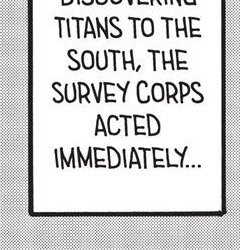

2. The emotional informant
This narrator is also presented in square speech bubbles, and is thus the second of only two “standard” narrator types. Type 2 is different from type 1 in the way that it’s used by several characters (Armin, Eren, Ymir, Reiner, Mikasa), whereas type 1 is so far only done by one entity (Armin’s voice in the anime, but not necessarily him). Type 2, as opposed to 1, address smaller matters, gives more personalized reflections, has shorter running time, and uses “I” more liberally (an informal narrator, in other words; I’ve chosen to call it emotional, because this version is largely driven by emotion and/or has clearer indication of personality).
Used by: Mikasa, Hanji, Kenny, Eren, Armin, Reiner
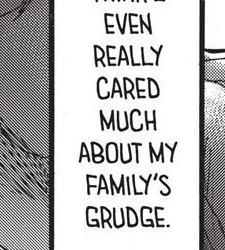
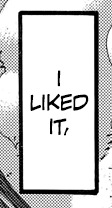
3. Extra information
Additional information presented in form of dry text. Mostly the kind of information that in the anime has been turned into half-time text cards, because it seems to be voice-less; “by the way, you should know this”. Other times it’s woven into the monologues of Type 1.


4. Speech overlapping
This is a verbal speech given by someone in the present time (or present time of a flashback), often done to drop smaller doses of information/exposition, or to retell a past event. It’s presented in round speech bubbles that overlap panels depicting something pertaining to the theme of the speech. It differs from regular speech-giving in that it 1. Is more informative, and 2. Is more frequently detached from the point in time or physical place it’s spoken from; the speech may start, middle or end with shots of the speaker, but will waver in time by visiting panels of events from the past and/or time-neutral symbols and scenery shots. This is a very liberally used method by Isayama, and sometimes it’s hard to separate this as narration from just larger spans of info-dump monologues. I’ve mapped some of the instances I feel it’s used as narration, but there are many more instances in there that’s on the fence and thus left out. Identify them yourself, if you want.
Used by, among others: Teacher, Armin, unnamed soldier, Erwin, Mike, Ymir, Reiner, Hanji, Pixis, MP man, Rod Reiss, grandpa Ackerman, Kenny, Historia, Floch, Grisha’s dad, Krueger, Zeke, Willy, Pieck.

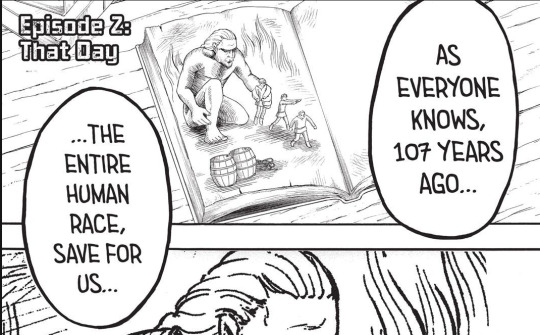
5. Retelling
This is a mix between type 2 and type 4: it’s an informal standard narration (2), but being spoken by a character in present time within the story (thus narration inside the narrated story). It’s similar to type 4 in that it’s verbally shared in the present, and is majorly detached from the speaker. Unlike type 4, however, type 5 is usually situated within the mentioned flashback; the speaker is talking in real time, but the scene is set to the past. It’s presented through hovering black text (same as type 6), to symbolize that it’s narration given to in-verse listeners as opposed to type 1 and 2’s time-suspended audience.

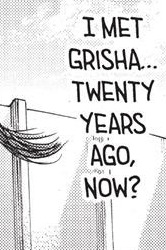
6. Internal monologue
This is internal thoughts presented in the same way as type 5: with hovering black text (or, for the first third of the story, interchangeably with rounded speech bubbles with fuzzy/spiked edges, as per type7). This borders on non-narration, as it’s unintentional as such. However, it’s often used for exposition and contextualizing drive, and thus serves largely the same purpose as narration.
Used by, among others: Eren, Armin, Mikasa, Ian, Jean, Sasha, Connie, Mike, Gelgar, Reiner, Ymir, Sannes, Levi, Nile, Pixis, Historia, Traute, Keith, Marco, Marlowe, Zeke, Falco, Magath, Gabi.

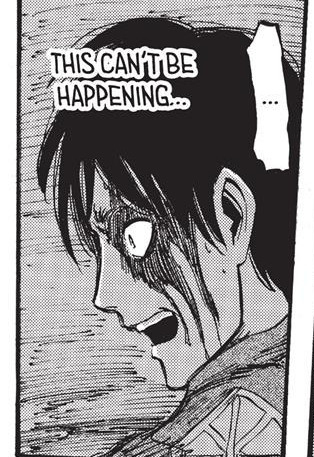
7. Echo dialogue
This is also unintentional narration: it’s dialogue from the past, echoing half- or fully detached from the speaker, (usually) over shaded flashback panels to indicate it coming from the past. It’s narration in the sense that the author – Isayama – has chosen to do callbacks to them in order to further contextualize the present time scene (in other words, it has the same function as type 6). Echo dialogue is presented in rounded speech bubbles with fuzzy/spiked edges.

Despite these categories, several instances of hybrids have occurred – or places where one type leads into another. The provided categories will help map narration for the sake of this analysis, but are a quickly thrown together attempt at such, and will unbeatably be flawed. Take them for the general overview they are.
Narrating voice
Now, that’s a lot of different types of narration, isn’t it? Yeah... But while they all have some significance, 4-7 are a lot less important for this analysis than the first three. Though, here’s some foreshadowing for you: get yourself acquainted with type 5.
Before I move on to 1,2 and 3, I want to say a few things:
a) The reason 1-3 are more relevant than 4-7, is that 1-3 are narrating voices directed (on purpose or indirectly) at the reader (or a reader/listener that is situated outside the ongoing story narrative; if not a real life reader, then someone in-verse being told the story after the fact) – while 4-7 are narrative voices inside the story itself. “Maria told Benjamin ‘I love you’ yesterday”: Maria is the 4-7 voice that said “I love you” yesterday, while the person telling the entire story of Maria telling Benjamin, is the narrator – the 1-3 voice… I hope I’m making sense, haha.
b) When we look at the chart (provided below), we’ll see that while 1-3 thus are the only official narrative ROLES in SNK, we’ll see that for the majority of the story, the in-verse voices, are the ones carrying the story. This way, we can say that SNK is – without a doubt – told from an array of POVs; while there are few narrating roles, the story does not want to be strict with who can talk, have focus, etc. The 4-7 voices jump back and forth between players very liberally; SNK is in a way a story about people, told by people. The 1-3 seem to serve as the wrapping that keeps it all together within a structured frame, on top of this.
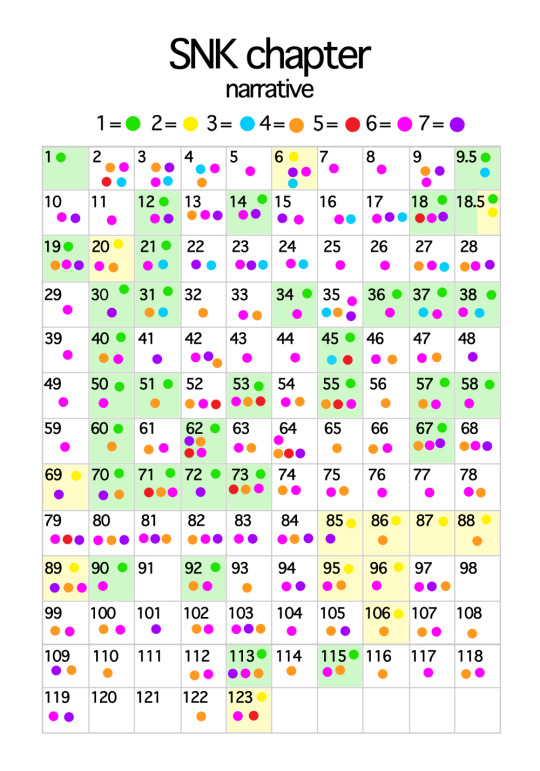
But not only the in-verse (4-7) voices are many… Also the type 2 narrator role has been shared by several people. Among those: Eren, Armin, Mikasa, Kenny and Reiner. There’s also Hanji – when talking about Sawny and Bean, Ilse Lagnar, and Ymir’s letter to Historia. The latter three are hybrids that, while not directed at the same listener as 1 and the aforementioned 2’s, are still presented in square speech bubbles, to indicate written and/or verbal distinct narrating role. (Although, I’m using the scans provided on the website kissmanga, which provides varying quality, chapter to chapter. Thus, it looks like Ilse’s chapter and the second part of Reiner’s story might be type 5s, drawn over in white squares by the translator. Either way, included or not, there’s enough material without this that the above reflections still stand).
1,2,3
Now to the narrator ROLES. Let’s be unconventional and start with type 2. Type 2 chapters are the digression-esque narrations that add an emotionally important piece to the greater story puzzle. They’re told by an identifiable in-verse character, and have both a clear beginning and end; whether abrupt or phased out, we can always tell when it’s over and slips back into general story mode. These narrations are not all told to the same receiver – and sometimes they seem to be mere musings with no direct recipient at all. But all of them are elevated as voices that transcend the reach of in-verse. Kenny’s piece is a perfect example of this. After the cave collapses on him and he’s sunken down against a tree to die, his backstory with Uri starts. Nobody is around, and he’s not casually type 6’ing it by just thinking about it to himself; he starts to muse. Cue the magical wavy “back then” segue into a flashback. Perhaps the difference between type 6 and type 2 here is that, while 6 is internal thoughts popping up while the story progresses, type 2 musings take over the drive; in Kenny’s case, the rest of the story goes on hiatus as we delve into his digression.
Kenny proceeds to think his way closer to present time, where he eventually wraps it up by wondering if he finally had his answer “or what”.
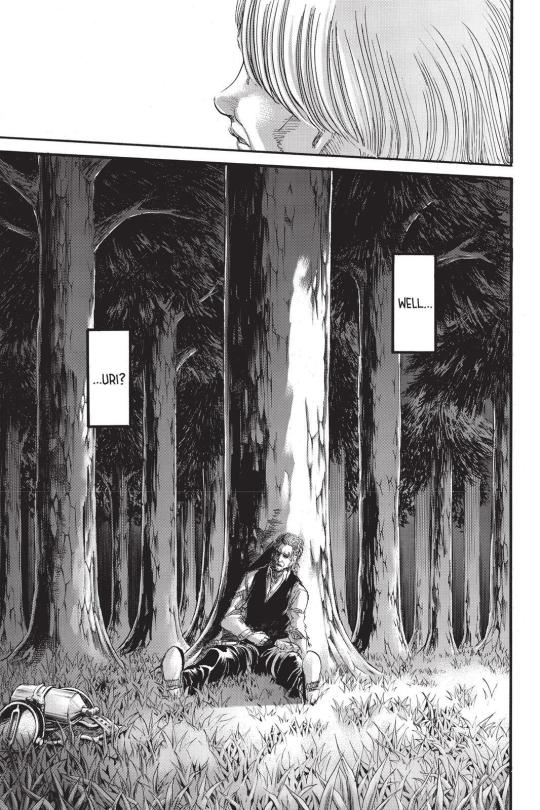
The story then uses this newfound context, to wrap up the theme, and find its way back to a more general POV. Kenny’s type 2 starts and ends here, at chapter 69. (Here’s my own digression: since he ends up asking Uri this, one could argue that he’s addressing his type 2 to Uri, but since the man is dead, I’m more inclined to believe it’s a general musing, where relevant players are sometimes brought to the forefront because they’re the ones they would talk with if anyone. Standard “deadman talking”).
The purpose of the type 2 narrator role may be debatable, but here’s my take on the matter: the purpose of there being a type 2 narrator popping into the story from time to time, on top of type 1 and in-verse narration, is that of a theme and relevancy compass. Sure, there are many more ways theme is stated, and MPVs highlighted, but these digressions oftentimes seem to enter at times where the story events are very broad– where the current timeline can be seen in many different lights, through many different POVs. The story can at these (though also many other) point(s) develop in a heap of directions, all equally plausible and logically relevant – especially with such a big cast. With these narrative digressions, a theme and temporary MVP can be naturally presented. With this compass, we’ll see which of the many plausible paths ahead, we’re meant to focus on and pay extra attention to. Like in Kenny’s case, we’re invited to put aside any “what if there was some additional spinal fluid left on the floor and a wounded MP licked it”, “are we gonna flip out about Eren’s new titan skills right now” or “Annie when”s; right now, we’re supposed to indulge in Levi and Kenny’s dynamic, and how Levi is about to develop as a character (which later will have an effect on the serumbowl).
Now… up until now, Armin has explicitly only had one such type 2 piece (chapter 106). He has had four smaller origin dumps: one in chapter 5 on how he was bullied, one in chapter 11 on how he was always a burden to Eren and Mikasa, a flashback through Eren in chapter 4 on how they bonded over the book, and a flashback through Eren in chapter 83 on how they first met – but none of these were told through a time-suspended type 2 narration. There are a lot of things pointing to Armin being the type 1 narrator, or in the very least someone whose POV we’re meant to keep in mind – and I’ll get to that when I talk about type 1 – but for the time being, can we be sure he’ll be type 2 narrator again? … It can only be speculated on, but to me, the odds are 50/50. Mikasa had a hybrid turned type 2 early on in the story (chapter 6), and another one in the newest chapter (123), so we know repeat narrators is possible. Armin is thus eligible for a type 2, a prominent character who’ll undoubtedly have something relevant to provide, but there is no guarantee that it will be necessary. Thus, we can only speculate.
But I’ll tell you this: even though Armin’s origin pieces weren’t type 2, I think they were meant to parallel Mikasa’s origin pieces going on at the same time. See, after Eren “died”, the POV toggled quite evenly between Armin and Mikasa, back and forth: we got Armin’s origin story pt1, then Mikasa’s. We were in Armin’s head, then Mikasa’s. Then Armin’s head again – then we were served a small continuation of Mikasa’s origin – because yes, she had a pt2 that was in the same style as Armin’s (type 6) – then Armin’s pt2. Over all, at the beginning of the story, Isayama’s use of the types was a lot less polished (something I’ll have to do a callback to later) than they eventually became; looking away from type rules, it’s in other words quite clear that we were being introduced to the two friends Eren left behind in equal tandem, priming them to take on roles as mains alongside him: we got to know their backstories, and how their internal voice sounds. I’m saying this because I think this kind of paralleling happened again: I believe Armin’s type 2 in chapter 106, is meant to parallel Mikasa’s type 2 in chapter 123. Just like the first round was about both their origins, this time, it’s about their reflections around Eren’s actions from chapter 90 until present time. Let’s have a look at their pieces:
Armin’s type 2:
“I know that… you wont like it… But I need you to hear this. At that time, three years ago… It might have still been possible… To change something. I liked it, back then. We Eldians were hated and feared by the rest of the world, by people from way across the sea who had never seen our faces. But… not only enemies came from across the sea. The world was a complicated place. And there were many things we didn’t know about. I’m just saying… that maybe… there is another way… I can’t get that thought out of my head.”
As his type 2 is a direct verbal narration to Annie, his type 2 turns into type 4 as his narration catches up with real time, where he goes on to say:
“[...] I want to understand Eren more than anybody… Even more than Mikasa does… But… I just don’t understand him anymore… Eren was going to go through with his plan, with our help or without it. Whether we decided to cooperate, or turn our backs, was a terrible decision we had to make[…]”
Mikasa’s type 2:
“Everyone ssays Eren has changed. I thought the same. But maybe that was wrong… Eren has never changed from the start. If that was Eren’s true form… I wonder… what part of Eren I had been seeing. We… didn’t notice. Or… perhaps we didn’t want to notice. Since that day… Eren disappeared from us. Afterwards, he wrote that he would entrust everything to Zeke. Next time our faces met, it was already too late. I wonder… if there ever really was a better choice. Perhaps everything was decided from the start. Regardless… I can’t help but think, if back then, I had… chosen a different path.”
Do you see the similarities?
a) They both present us with what’s on the line for them: their heartfelt connection to Eren. For Armin, it’s their shared dream that faded, for Mikasa it’s her romantic feelings that never came to fruition.

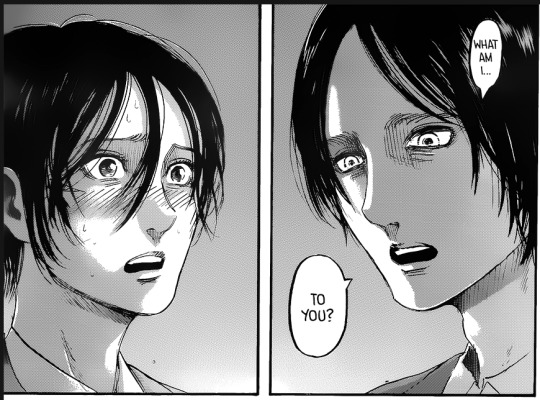

b) Both of them express a reluctant re-evaluation of their view on him.


c) Both chapters cover the same storyline of an emotional separation and Eren’s eventual run-away, albeit with different personalized backdrops; they both directly parallel each other about Eren writing home.

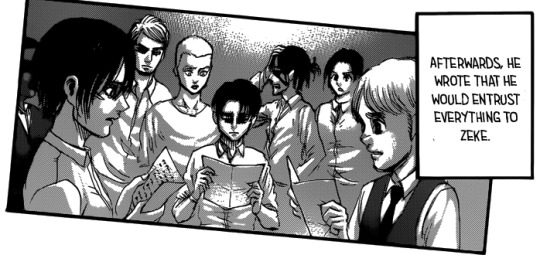
d) Both narrations feature Sasha as a symbol for how they feel like the path they took, felt “not right” to them.
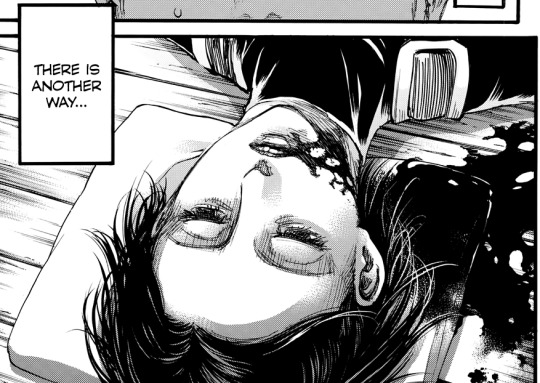

e) They both express feeling like they had no say in the matter; that they had no choice...

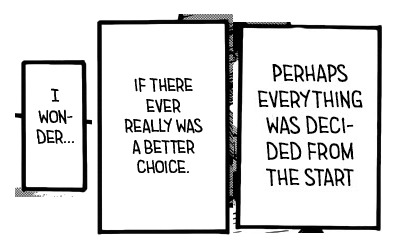
f) .. and yet, they both express a nagging, lingering thought that maybe... just maybe, there could have been a different path.
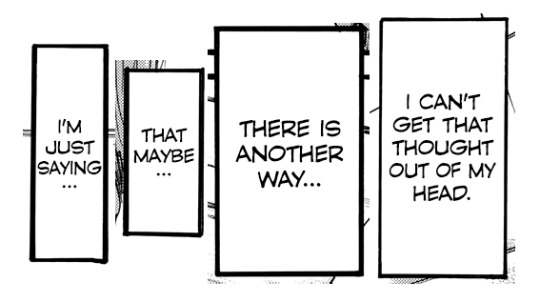

If we agree that these similarities point to the chapters paralleling each other, it would stand to reason that they’d both need the same kind of treatment going forward. Both chapters put something on the line, and both open up the theme of “was this inevitable, or was there another path we could have taken?” They’ve presented a problem, which in fiction needs solving. The problem belongs to both chapters, and thus the answer also does. Now, perhaps the upcoming chapters will show us in convincing details how there was indeed no way to avoid this, because Eren was always headed down this bleak, hate filled spiral. In that case, neither chapter might need a follow-up, as Eren can indirectly answer that through theme and we’ll have our answer in his actions. But! If the coming events will provide us with this elusive “other path”, and the conclusion becomes complex to the degree that these chapters need a follow-up, I believe they’ll both have one.
So, is Armin an eligible type 2′er? Yes. Is he likely to have another type 2? ... It’s 50/50. Personally, I believe we’ll see another type 2 from him. But as type 2 isn’t the over-arching narrator, and the story can end properly without another type 2 of any kind, it’s not a given that we’ll see another one. If the narrator of type 1 is nobody - just a voice without a body - then it may indeed be true that Armin has narrated his last chapter. I don’t think he has. But it’s possible.
... If he’s not also the type 1 narrator.
Type 1: THE narrator.
I said at the start of this that my aim was to find out whether Armin would narrate again or not. My initial worry was that since Mikasa was narrating the newest chapter, this meant she was the new narrator. It caught me off guard; I hadn’t been paying attention to the fact that there had been several type 2 voices – even less so that the type 2 voices were different narrators from the type 1 voice; I wrongfully assumed that the overarching story narrator, and these personalized digressions, were the same voice. Now that I know that type 1 and type 2 are separate roles, should that not answer – without a doubt – that type 1, remains the same: Armin? Well… With the narration discourse flaming back up, I’ve taken notice of some claims that Armin isn’t conformed as the type 1 narrator to begin with. As a matter of fact, @suniuz – someone I know to be a well informed and reliably source critical gift to our fandom – recently mentioned having remembered an interview with Araki, where the man gave an explanation for why he had chosen Marina Inoue for the voice of narrator. In other words, it may seem as though the identity of the narrator hadn’t been decided by Isayama, until the anime adaptation needed someone to voice the text. And even then, a) does this mean the choice of voice actor doesn’t have anything to do with the identity of the narrator; aka, the narrator is Marina Inoue, not Armin? And b) even if Araki’s choice influenced Isayama to decide it was Armin, does the fact that Isayama hadn’t already decided on this, mean that the identity of the narrator isn’t meant to play an important part to the story?
Now, I don’t have time to dig for this interview myself (if anyone knows of it, I’d love a source), but I want to address these arguments all the same. Because while “Armin voices type 1, hence Armin is narrator confirmed” could easily settle my question of “will he narrate again” (now that I see that type 1 and type 2 are separate, and that the type 1 narrator never did - nor likely ever will - pass hands), I still want to combat the obviously relevant argument that the type 1 doesn’t belong to anyone. Obviously, as Marina is cast to give voice to the type 1 text, we will at the very least, indirectly, hear Armin’s voice narrate again. However, I both want and believe that it’s not only Marina, but Armin, who is this voice. Here starts my analysis of why.
Armin as THE narrator:
In SNK, there is a distinct “I”; a person, as type 1. The narrator, despite being mostly formal, does have a distinct emotional presence ala type 2: on several occasions, the narration includes unnecessary and/or subjective observations, such as “… the flowers had begun to bloom as the butterflies danced” (ch. 90), and poses questions (indicating a consciousness capable of wondering and/or rhetorical thinking), such as: “how did the humans who saw that sight feel?” (ch. 73).
Not to mention, there are explicit pronouns used: “we’d have four people ready with enough horses for everyone” (ch. 58), “the precise location was the Shiganshina district, south of wall Maria, where the titans broke through five years ago, and where the three of us had lived” (ch.12).
The instances where pronouns are used, the narration borders on type 2. Especially in chapter 50 (“…we didn’t know what Ymir’s actions meant”) and 58. It borders on type 2 to the degree that it’s questionable whether this is still the type 1 narrator at all. However, these instances stick out like a sore thumb, if they were to be placed in the type 2 category: unlike all the other type 2s, these are not explicitly attributed to one character, they don’t digress from the ongoing story drive, and nor do they have concrete beginnings and ends. In other words, they are injected into the story in the same kind of hovering, sparse POV as the type 1 narrator. Given that this happens several times throughout the story, I feel confident stating that this does not come across as unrefined narration that fell between two types before Isayama knew how he wanted type 2 digressions to work – but instead seems to be the type 1 narrator. After all, it cannot be explicitly attributed to any other role, nor would it have a strong place or point, if serving as anyone’s momentary additional voice NEXT TO the narrator.
This appearance of a personal “I” in narration, happens as early on as in chapter 12. SNK started its serialization in the monthly Bessatsu Shounen magazine in Semptember of 2009. If we consider SNK from then on being published monthly, this means that chapter 12 would have been published during fall of 2010 – almost two whole years before WIT studios was founded (June 1st 2012, according to Wikipedia). See where I’m going with this? Well: to me, this is a strong argument in favor of the narrator having been a specific person long before Araki decided whom to cast for the voice. Thus, him giving an explanation for casting Marina, other than “Armin is the narrator”, seems obsolete. My guess would be that it was an intentional avoidance of spoiling the fact that Armin is the narrator, without technically lying; for example: if his argument was that her voice was soothing for such a role, it wouldn’t be wrong – she does, after all, make for a comfortable narrating voice, generally speaking – it’s just not the only reason/whole truth.
Saying this, I believe that there has been a concrete identity for the narrator from the start. Furthermore, I believe that the identity of this periodical “I” speaker, is the identity of the narrator. So, who is the “I”? If it’s indeed an unchanged “I”, it’s either Armin or Mikasa: knowing from chapter 12 that the narrator is one of the EMAs (“where the three of us had lived”), it can be narrowed down to the two of them thanks to chapter 58, where the narrator expresses being part of a plan that only Armin and Mikasa from EMA, took part in. Other arguments aside, Araki’s own casting, will in this moment be reversed from an argument against Armin, to one in favor of him: why cast Armin’s voice actor, if the “I” is Mikasa? He wouldn’t.
I feel like I could close my little analysis here and sit comfortably on my beliefs – at least for the time being – but I want to keep going with some less concrete, more circumstantial evidence that, without being hard proof, perhaps still helps to swing the pendulum further in the favor of my above conclusion:
1. Armin phases in/out like a narrator.
This is perhaps the least waterproof of my observations, but nonetheless the one I’ve been leaning on the most: Armin gives off the “feel” of a narrator – or more precisely: the one whose POV we’re meant to take. You may find everywhere, what you look for, but consider these:
a) Unlike in the anime, the manga doesn’t show the 104 bootcamp years until after the battle for Trost is won. The trainee years are a sudden re-winding in time – a big positional move in the story. So far, the story has been linear. Chapter 14 closes with the narrator taking over (the “end scene” being one where Armin is present) wrapping up how the battle for Trost was humanity’s first win against the titans… and the next thing we know, we’re sent back in time, to a scene where EMA are working in the fields. The scene’s main purpose seems to be that of showing how Armin’s upset with the MP’s population management. In other words, the scene is entirely Armin centric. It furthers his drive, his POV. From this scene, we’re segued into a wide shot of Armin presenting at bootcamp. In addition to this contextualizing why specifically HE (of all people) took the path of joining the military, this is also our introduction into this 4 chapter long bootcamp side-story; Armin’s the one we’re entering it through. If there is indeed a conscious narrator, it would make sense that the narrator is the one deciding where, how and when to jump in time, story-wise. They are the one telling it, after all; they’ll know when a jump in time and additional digressions is necessary for the context. Even more: would it not make sense that, with such a jump – given that it’s chosen by the narrator – the starting point of such a reposition, would be through the POV of said narrator (if not a type 2, which this wasn’t)? There is nothing concrete, like I said, but… it FEELS like Armin is the one whose eyes we’re seeing this transition and opening through. Aside from Eren opening several of the bootcamp scenes that follow, Armin is the only other lead who does this: in chapter 18, he’s the one who opens the last flashback scene: the jog-scene. Here, he’s the first one to be monologued about by Keith, and is thus furthered as an MVP.
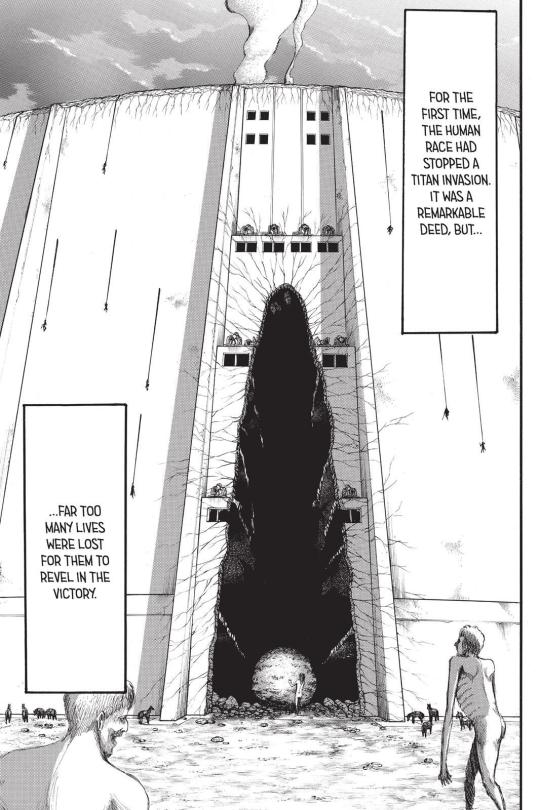



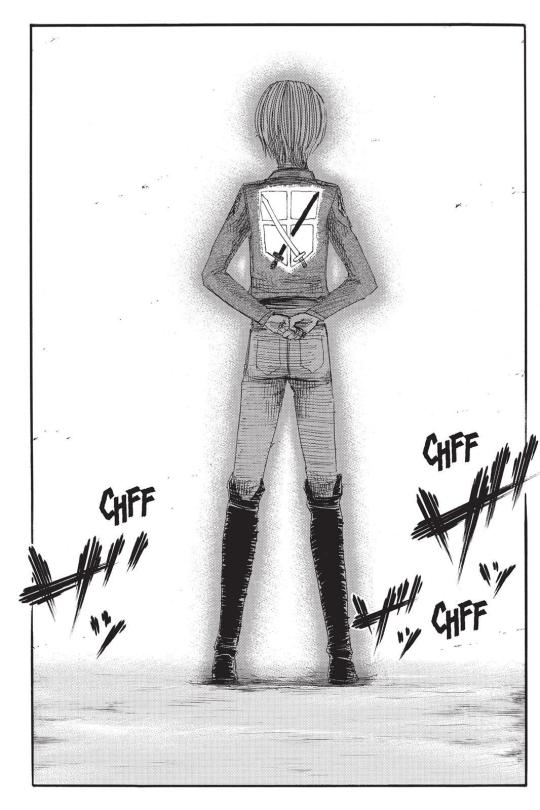
b) Perhaps the most remarkable of these transitions, though, is the one in chapter 73: EMA are making their way back to Shiganshina – RTS to follow. At the end of Armin and Eren’s talk (the one about his eyes), Mikasa joins in about how she recognized the area, and Armin makes a comment about how “We’re back here…” Right here, the speech bubbles do something interesting: they go from regular dialogue, move into type 4, and then end on a type 5. This is yet another “feels to me like” example, but if you’ve gotten yourself acquainted with the types, perhaps you see it too: the way Armin talks, starts to sound a little synthetic if it’s supposed to be seen as regular dialogue, when he says “for the first time… since we ran away that day.” Eren and Mikasa both know it's the first time they’re back and that it’s the first time “since that day” specifically; telling them this in the way he does, feels redundant. This could be the mark of meaning lost in translation, but reading the entire work translated, Isayama isn’t USUALLY this synthetic, in my opinion. What more, this isn’t all there is to it: the redundancy is expressed in a scenery panel, removed from the speaker and carried away to a bird’s eye view. In other words, despite this initially seeming like regular dialogue spoken to two people right next time him, Armin’s words start to detach from him, and turn into type 4: informative monologue. This isn’t necessary, nor natural, unless the audience broadens; he’s talking to Eren and Mikasa, but we get the feeling that the words are starting to transcend into narration that we, as readers, also are hearing. We could still be on the fence about that, however, until the wide shot of Shiganshina, and the words “back to our home town” is presented as a clear type 5, in big letters, over it. Type 5 is a style Isayama has used explicitly for conscious narration. Thus, as these words - in this example - are either spoken by Armin or by the narrator, this cannot be type 6, which looks the same, but is subconscious thought. No, this is a clear indicator that Armin’s words turned into narration. Whether the narrator of the story chose to highlight what Armin said, for the sake of his (the narrator’s) own use or not, can be debated, however, the fact that this is supposed to be a narrating technique, is clear.

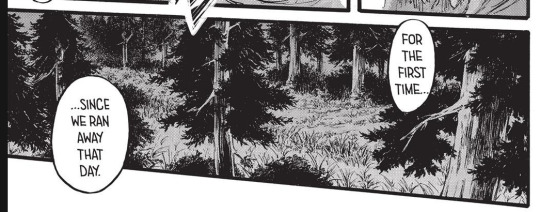

To me this is, therefor, another indication, that Armin is the narrator.
2. Armin journals
We’ve all seen the picture. Armin taking notes in Eren’s cell. What, exactly, is he writing? The only time Eren type 2s, is when he’s talking about his father’s journals, at the end of chapter 85. It’s brief, and then the next chapter opens with Grisha’s journals narrating. The way Grisha’s type 2 phases out, is by the story returning to present time, where Eren is discussing Gisha’s memories with Armin, who’s writing something down. It’s clear to me that, in the very least, Armin is taking notes on Eren’s memories and how they correlate with what’s written in Grisha’s journals. Eren type 2ing in chapter 85, is apparently, the opening of him talking to Armin about all this, in his cell.
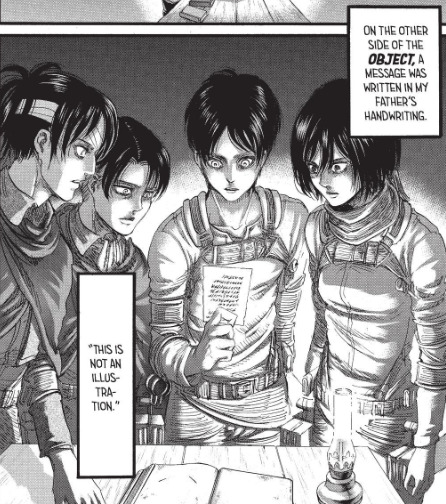
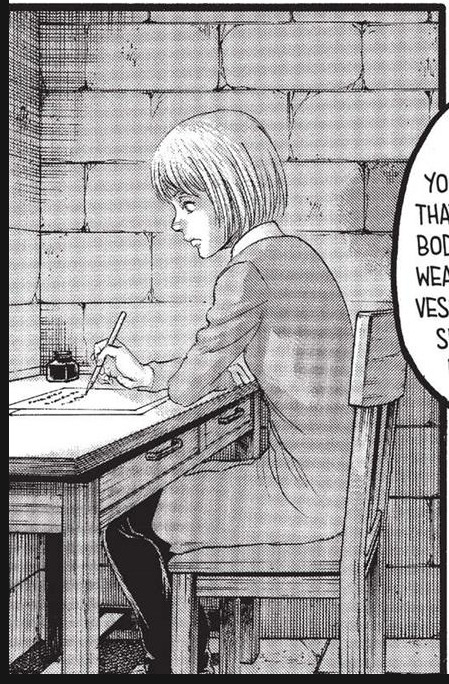
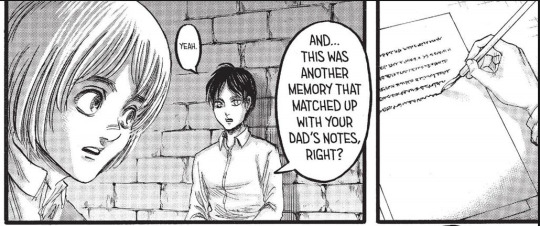
So what? Well, seeing as Grisha’s journals are already written, there is no need for Armin to re-write all of the information they already have gathered in Mr. Yeager’s notes. Armin is thus - like I already mentioned - AT LEAST, making original notes on Eren’s memories; how they support the claims of the journals, and expanding on the knowledge where Eren’s able to see more. A more creative take would be to say Armin’s writing his SNK narration right now, but even without that take, there is definitely something to take away from this: we’re being explicitly shown that Armin is either appointed, or voluntarily record-keeping. That’s a role he’s now explicitly shown to have. Let me reiterate: he is canonized as someone who naturally fits the role of re-teller.
3. Is this story oral or written?
*It’s time for me to make a callback to this very early asterisk: “Type 1 [...] Presented in square speech bubbles*”. Above, I talked about how Armin’s words turned into a type 5 in chapter 73. So what? Well, aside from it being one of the types that are unmistakably conscious narration - making this an instance of narration, it wouldn’t be a stretch to say this is THE narrator, because: at the beginning of SNK, the narrating voice, was not presented in its now iconic square bubbles: the beginning was, like the instance in 73, type 5:

5. Retelling
This is a mix between type 2 and type 4: it’s an informal standard narration (2), but being spoken by a character in present time within the story (thus narration inside the narrated story). It’s similar to type 4 in that it’s verbally shared in the present, and is majorly detached from the speaker. Unlike type 4, however, type 5 is usually situated within the mentioned flashback; the speaker is talking in real time, but the scene is set to the past. It’s presented through hovering black text (same as type 6), to symbolize that it’s narration given to in-verse listeners as opposed to type 1 and 2’s time-suspended audience.
This will have to be a wild guess - especially since Isayama’s narration types were a lot less refined in the beginning (though type 5 has been the most unwavering of the types), but I believe that the story of SNK is narrated, specifically, orally. The narration starts out being told in the type that throughout the story has been specifically spoken narration. More so - if connected - it has another instance of this use late into the story (73), which at this point means Isayama knows his types too well for it to be a mistake.
This does, however, not discredit the argument above that Armin keeping records is a point towards him, because you’d likely need to keep things on record in order to remember the kinds of details that the narrator has been able to pull up anyway (not to mention that Armin still, with that chapter, is pointed out as a natural narrator type person).
So while irrelevant to my initial question, I find it interesting to theorize that the story is being told verbally. I’m looking forward to see if it’s right or not.
A second narrator?
“God, will it never end? We get it, Armin’s the narrator”. Yes, yes, at this point, I don’t have much more to add. I’ve given my musings and then some. But I wanted to bring up one last point of interest before giving you some rest from this long ass meta: type 3. Thought I forgot?
You see, type 3 is the dry information bit. I believe that in certain instances, where all the narrator says, is “Stohess district” or the likes, might actually be type 3 instead of type 1; especially when the narrator doesn’t add anything else. But in this case, where does this type 3 information come from? Is this a second, identity-less narrator (more like the author himself)? If so, what does that mean for the personalized type 1er? I don’t know...
it’s worth comment on the varying degrees of personality the type 1-presenting pieces have. Especially when chapter 73 and chapter 90 are concerned; while the narrator becomes more personal in chapters such as 12, 50 and 58 - in 73 and 90, he becomes... more linguistically embellished. So while the first bunch can be challenged as perhaps type 2ers and not the main narrator, the second two (73/90), can - with their strangeness - perhaps point towards further proof that Armin is the narrator. namely, 73 is the chapter that opens up the Return arc - the arc in which Armin plays a big role and eventually gives his life. it would not be surprising if the narrator - if Armin - would have a more personally emotionally affected approach to this part of the story. The same goes for chapter 90 - the chapter in which Armin reaches his life long dream of seeing the ocean. In this chapter, the narrator remarks on things like how the snow falls and melts, and how the flowers bloom and butterflies flutter. In other words, the narrator seems more sentimental, or even enamored with the upcoming segment.
What this has to do with type 3 is that, looking closely, we’ll see just how varying the type 1 narration is. So... is it possible that the instances of the narrator being more flat, is a different narrator altogether? If so, that opens up the can of worms that is: “the overarching narrative isn’t tired to one single entity at all, and is just a culmination of important contextual information, small clarifying comments, musings to spark curiosity, etc.
Because there’s also this:


As well as:
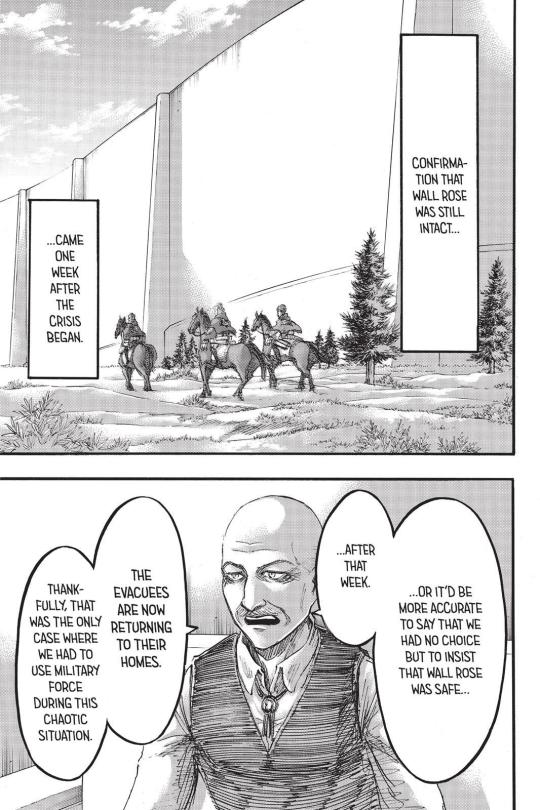
... which almost seems to indicate Erwin and PIxis narrating these particular instances of the narration.
It’s all up for debate - although, given all the evidence I’ve provided in Armin’s favor, I personally wager that these are casein in which the narrator summarizes information that Erwin and Pixis are talking about in such detail that it’s better to have a summary and jump in at the end of said speech, rather than having to sit through half a chapter worth of unnecessary details.
There’s a couple more points of interest what type 1 is concerned, but at this point, there’s nothing concrete in either camp, and this thing is getting entirely too long. So I’ll leave you with this:
TL;DR: Will Armin narrate again? As an emotional narrator, not necessarily, yet it’s plausible. As the overarching narrator? If he is the narrator, yes, but... is he? I still don’t know. In conclusion, I don’t god damn know. I think so, but I don’t know.
#Armin Arlert#snk#snk 123#snk meta#loooooooooong post#I had so much more to say but I'm so fed up with this now *sob*#If anyone actually reads this all the way through please time it and tell me how long it took you to read because holy hell
36 notes
·
View notes
Note
For Post-Script, what do you think is your favorite aspect of using an epistolary narrative style? (Bonus: How do you hone your narrator's speaking voice to make it feel as authentic [and relatable] as possible, especially given the absence of typical exposition that we might see in other more traditional narrative forms?)
Mina, thank you so much for this wonderful question! It’s really interesting and something I hadn’t outright considered; I really enjoyed thinking about it. You asked this ages ago, and I’m so sorry that it’s taken me so long to answer!!! I swear I appreciate it and I wasn’t ignoring it.
For those of you who don’t know, Post-Script is a WIP I write with McHaggis (@decantae) written in a letter-writing format. Here is the WIP page.
What do you think is your favorite aspect of using an epistolary narrative style?
I really just love the whole aesthetic of writing letters! Especially in this day and age where phone calls, DMs, and video chat is so prevalent, letters have become a bit more obscure and even more special than before. It has an intimacy to it, and it feels very personal. This is especially true in the case of love letters, which Post-Script will eventually evolve into.
Also, the entire reason why we decided to write together in an epistolary format is because McH loves the style, and they talked me into loving it as well. We’re both trash. Writing Post-Script also goes really quickly for us since there’s less exposition and prose to go through, and that’s a really nice bonus.
Writing wise, it’s quite interesting because in my opinion, the show-vs-tell is done really differently.
For example, in most traditional narrative styles, we experience what the protagonist(s) are experiencing. We are told what they feel, we are shown what they see, etc. However, in an epistolary narrative style, it’s all based on what each person is willing to write to the other — in other words, it’s mostly ‘tell’. When people usually write letters, they tend to be more straight to the point rather than layers of prose and description about what story they’re telling (of course, this isn’t always true, and that’s perfectly fine). Bishop and B.S., our two main characters don’t do that, at the very least.
Aside from the mystery and the conflict going on in the plot of Post-Script, one of the most important themes about it is the evolving relationship, and its eventual culmination into a romance. This is what we have to show via tell because neither of them will actually articulate it to each other until there’s a significant turning point, and there’s no way to add exposition, internal monologues, actions, etc., to help us imply it. So we try to do it tonally, by shifting how and what they talk to each other about as they get to know each other better. It’s a fantastic challenge, and has really helped us shape the voices for our characters.
Using an epistolary narrative style also allows us to experiment with what we choose to reveal and hide in a way that doesn’t happen in a more traditional narrative style. We have a plot and several subplots going on in the background, but they’re usually not described in detail — it feels like a grand experimentation with foreshadowing because you never know when that one minor detail in a letter dated several months ago will suddenly become relevant. There’s a lot of things our characters don’t reveal to each other; things they don’t think are particularly relevant or meaningful; purposely include or leave out; or just possibly are not aware of what’s going on.
I know that this happens in most people’s plotting and writing — I don’t think I’m articulating this properly haha. I guess what I’m trying to say is… We have to think about it differently because it’s very limited, so it feels very different.
I think Post-Script really benefits from it being a Harry Potter fanfiction. Unlike original fiction with its own lore, we can safely assume that most of our readers have an understanding of the Wizarding World — we don’t have to have our characters explain what the Ministry of Magic is like, for example. or what the Order of the Phoenix is. Both Bishop and B.S. know what they are, and we don’t have to force an explanation anywhere because our readers are already familiar with it. It may required more thinking if it was different.
How do you hone your narrator’s speaking voice to make it feel as authentic [and relatable] as possible, especially given the absence of typical exposition that we might see in other more traditional narrative forms?
First of all, I think the fact that two people are writing this really helps. McH writes for Bishop, and I write for B.S.; we can both focus on honing the voice of our own character without having to worry about differentiating, and nailing another character’s voice. We both have different writing styles and a very good understanding of what our characters sound like, so we don’t have to worry about them sounding too similar. I don’t know how much difficulty I would have in making sure each voice is distinct if I was writing this on my own.
And for me personally, I consider dialogue and characterization to be one of my biggest strengths in writing so it’s actually a lot easier for me to convey B.S’ voice in this format than it is in narrative prose. B.S. is especially suited for a format like this because she’s a very distinct character who isn’t particularly worried about formalities or holding herself back. She’s very honest and true to herself, so almost immediately right off the bat, I was able to start incorporating her authentic self into the letters by adding in dumb jokes that she thinks are clever and funny, and writing out exactly what she thought about their conversations.
Exposition is usually just B.S. updating Bishop on what’s happening on her end and because that would be very boring on its own, I take advantage of the fact that it’s filtered through her very opinionated perspective. No person is truly a neutral third-party, so it adds a bit of realism and character to every piece of exposition I write in Post-Script. What B.S. gets mad about for example and goes off on a rant helps characterize her by showing how she gets angry and what she gets angry about, while simultaneously filling people in on an important moment of the plot.
The small things are also really important; just a little extra detail that’s not necessary to the plot or to their agreement of exchanging information, because they do have a life outside of the plot, and every single thing helps paint a better picture of who they are. There’s also the added bonus of the small details illustrating the evolution in their relationship as the details become more personal, and more mundane as they get more comfortable with each other.
It’s also interesting to note: I’m by no-means mischaracterizing B.S. in Post-Script, but she’s a bit different in person than she is in her letters. You know, similar to how our online personas and personalities aren’t always congruent with how we present ourselves in real life. B.S. comes across as a lot more confident and smooth in her writing, because words are her strength — writing is her job, so she’s very good at conveying her thoughts, and has the courage to be bolder. In person however, she’s easily flustered and is a lot more emotional, so the way she reacts to Bishop in writing, is very different from how she would react to it if he had said those things to her in person.
This is so long I’m so sorry! I also rambled a bit really late at night, so many apologies if this doesn’t make sense.
12 notes
·
View notes
Text
Crash Course in Dialogue, Part I
Writers tend to stress a character’s actions as the most important way to show who they are, but creating effective, interesting dialogue is just as important to a great story. Good dialogue can illustrate interpersonal relationships, reveal fears characters don’t even know they have, show development, and so much more. At the same time—and maybe more importantly—bad dialogue sticks out like a sore thumb, making readers uncomfortable and unwilling to get invested in your narrative. Your prose might be amazing, but if your characters can’t communicate, it’s going to put people off.
But never fear! Here are a few handy tricks to writing amazing dialogue that will get your characters saying what they mean or misdirecting like a pro, all while drawing your reader successfully into the story.
Creating Unique Voices
When you start writing dialogue, one of the most important things to keep in mind is that your characters should all sound different from one another. Just based on their words alone, a reader should be able to tell whether your character’s personality is bubbly or gloomy, if they feel comfortable with the people around them, if they’re in pain, what kind of education they have, and so much more. You want these factors to be unique for each character, even if they were raised together or come from a similar background.
A great test is to write down only the spoken part of your dialogue, without any speech tags (he said/she said, etc.). Does each character sound distinct? Can you tell whose lines are whose just based on what they say, without the surrounding context clues?
If not, try some of the techniques below. There are so many ways to say the same thing differently—and reveal your characters’ history, personality, and quirks at the same time!
Techniques
Using lots of big words like abysmal, paramount, satiate, ubiquitous, etc.
This can make a character sound more educated, imply a wealthier upbringing, or show the care he puts into communicating. Or, it can make him sound pretentious, and become a trait that annoys your other characters. Just be careful your character doesn’t come off like a weirdo carrying around a thesaurus in their pocket (unless that’s what you’re going for, of course!)
Character 1: His rant was just the shameful rambling of a crazy old man.
Character 2: The display was simply the ignominious drivel of a deranged geriatric man.
Using clipped speech—only a few words at a time, monosyllabic answers
Quiet characters, characters who don’t like their companions, characters who are in pain, and characters with something to hide might not want to have long conversations where they bare their soul to others.
Character 1: I really don’t think so. I’m sure I’d remember an intense reaction like that.
Character 2: No.
Using terms of endearment or pet names—babe, sweetheart, bro, dude, pal
Depending on how these are used, your character can come across as warm and fuzzy, sarcastic, flirty, or evil and taunting.
Bonus: if your character is angry or distracted, they can leave off the pet names they usually call their friends. This is a good way to reveal to a reader—and other characters—that something fishy is up.
Character 1: Can you toss me that pencil?
Character 2: Hey babe, be a sweetie and toss me that pencil?
Character 3: Uh, that’s my pencil, pal.
Character 4: Toss me that pencil, bro!
Speaking formally versus informally with contractions
Is your character uncomfortable around present company? Are they trying to act extremely professional to prove they’re qualified for their job, or still recovering from a strict, affectionless upbringing? If so, making their speech more formal can help convey what’s going on.
Character 1: Admittedly, I have been wondering much the same thing. I will look into it.
Character 2: Yeah, I’ve been wondering that too. I’m gonna check it out.
Swearing
Depending on context, characters who curse can sound meaner, rougher, cooler, more laid-back, and even funnier than the people around them who don’t.
When using curse words, be aware of your audience. If you’re writing for kids or younger teens, you may get some pushback.
Remember that these words are sometimes at their most powerful when they’re not overused. When your sweet character finally snaps and mutters something really strong under her breath, you’ll know she’s at the end of her rope.
Think of Simon finally confronting Martin in the movie Love, Simon—if Leah (who swears all the time in the book’s sequel) told Martin to f*ck off, it wouldn’t have anywhere near the same impact.
And yet, in The Raven Cycle by Maggie Stiefvater, Ronan’s glee at swearing is one of the things that sets him apart from the more polite Gansey and Adam.
Try this:
Sit in a public place where people talk—a coffee shop, a food court at the mall, a break at school—and listen to a conversation. Write down what you hear—every little um or ah, pronunciations, pauses, stutters, repetitions. How do words, fillers, and phrases shape the distinct voices of the people you’re listening to?
Using Accents and Dialects
Another great way to make characters sound different is to give them accents or let them speak in dialects. If your character is from the South, he’d have a Southern drawl; if she’s from the India, she’s not going to sound like your classmates from Connecticut. But how can you capture a voice like that without making your writing sloppy or distracting (or exaggerating it into an offensive caricature)? Passages like the following, from Huckleberry Finn, certainly take a lot of concentration to read:
“Oh, Huck, I bust out a-cryin’ en grab her up in my arms, en say, ‘Oh, de po’ little thing! De Lord God Amighty fogive po’ ole Jim, kaze he never gwyne to fogive hisself as long’s he live!’ Oh, she was plumb deef en dumb, Huck, plumb deef en dumb—en I’d ben atreat’n her so!”
A general rule, using features other than phonetic spelling to show how characters speak differently can communicate the same information in a less distracting way:
Diction/word choice: Taylor from New York eats fries for lunch and chips as a snack, but Henry from London eats chips for lunch and crisps from the vending machine during his break at work.
Syntax/word order: Someone whose native language is English will likely say “the brown shoes” or “the white fence,” but if your heroine was born in France and learned English not long ago, she might say “I was wearing my shoes which are brown” or “the fence that is white stands behind the house”
Idioms: Different places have different expressions that mean more than what they look like. While you’d say you’re “buttering someone up,” someone who speaks Spanish might say they’re “stroking his beard.” Research idioms that would be a natural part of your character’s speech—or, make up your own!
Some phonetic spellings and slang, every once in a while, do a great job of signaling a continuing accent: s’pose, ain’t, ya, dahlin’. But if what you’ve written takes any amount of real concentration to decode, it’s going to be annoying, not helpful or cool. In other words, if your main character has a lisp, tharting every thentence like thith ith going to get really fruthtrating, really fatht. An’ writin’ an o’er-exaggera’ed Cockney accen’, owr a loooong Suthen draaaawl, is sure to get on your reader’s nerves as well.
If your protagonist’s baby sister with three lines has a lisp and says, “Thamantha, read me a thtory” or her great-auntie from Georgia bemoans, “Lawdy-me, it shaw is hawt in hea today” once in 300 pages, though, you’re probably good.
If you want an example of dialects and pronunciation done really well, check out the Chaos Walking series by Patrick Ness. Protagonist Todd Hewitt grew up in a primitive settlement and can’t read—while always completely understandable, he does say “ain’t” all the time, and occasionally throws in misspellings like “creacher” and “recognishun.” The sections narrated by his friend Viola are more grammatically correct, because while Todd was doing farm work, she was attending school. And people Todd meets with even less schooling than him talk like this: “Ah kin give y’all a ride thrus. If ya want.” (But these characters don’t pop up very often, so the style doesn’t become distracting—instead, it highlights the differences between outsiders and the protagonists.)
A note of caution:
Remember that African American Vernacular English, American Sign Language, and other variations/translations of English have their own complex rules. If you aren’t familiar with a dialect you’re writing, don’t just simplify standard English, throw in an extra “be,” or take out some helping verbs. If your character uses one of these, do some extra research to make sure your dialogue is accurate.
Include the Right Kind of Content
So now you’ve decided how your character talks—but what should they say? Here are a few things to avoid: small talk, excessive info dumps, drawn-out background information, and background conversations. (Like most rules of writing, these can and should be broken if you have a good reason, but in general, they can be helpful in moving a story along and keeping it interesting.)
Instead of the characters taking up valuable space and audience attention on pleasantries, focus on the real meat of the conversation. Alfred Hitchcock once said something to the effect of, “Drama is real life with all the boring parts cut out.” Which would you want to read about? A character describing her brunch of thick, fluffy pancakes to her mother in mouth-watering detail?* Or the moment she asks her mother for $500—the third time this month—to cover her outrageous credit card debts? As the writer, you have the privilege and responsibility to pick the important moments to pass on to the reader—the ones that are important to the plot later, that develop the characters, that are memorable and exciting. Be kind to them—and yourself—by carefully judging what’s worth everyone’s time.
This then gives you an opportunity to work something else essential into your conversation—conflict. It’s very hard to make a compelling conversation where each character agrees with everything said before them. Just because “yes, and” works for improv, doesn’t mean it’s the best strategy for dialogue in fiction—instead, put your characters against each other. If they have opposing goals, or even slightly different takes on a situation, you’ll be able to flush out both viewpoints and push them to an interesting breaking point much easier than if they simply build on whatever the other says.
It can also be tempting to save long, detailed explanations for dialogue—especially when it comes to worldbuilding in sci-fi or fantasy. If you have a physics professor who’s perfected time travel or an old witch who’s worked out everything about magic, it would be easy to give them a few pages to give the specifics to your clueless protagonist. But unless you can’t get your story to work any other way, try not to do this—long descriptions tend to end up pretty boring, and hard to follow and remember. Instead, let your reader pick up fewer details at a time from different people, or see how things work for themselves. In the first Harry Potter, Hagrid doesn’t explain everything about being a wizard to Harry—readers get to experience the many magical details firsthand through Harry’s eyes in Diagon Alley, and then later at Hogwarts.
*Note: If your character is a cook and criticizes the pancakes because he could obviously do better, or if she grew up in poverty and is promising her mother she’ll move back home and take her to brunch every morning once she gets one more paycheck, this is obviously fine. So is her describing how great she thought the pancakes were if it turns out they were actually poisoned, and next thing she knows she’s waking up from a 10-year coma. And so on... Find exciting exceptions!
Try this:
Listen to a scene from your favorite movie and think about what’s included and what’s not. Do both characters greet each other and ask how the other has been, or do they jump right into the deal they need to make? Does one character agree with everything the other says, or do they disagree frequently?
Have more questions about writing dialogue? Leave us comments for Part II, coming soon!
#archetypeonline#blog post#writing style#dialogue#creative writing#writing advice#young writers#genre fiction
3 notes
·
View notes
Text
Today I am delighted to open up the #booklove once more to celebrate the launch of Sandra Imrie’s new book, Connectedness. Happy publication dat Sandra and thanks for visiting my blog. Here’s a little more about Sandra and her books.
About Sandra
Sandra Danby is a proud Yorkshire woman, tennis nut and tea drinker. She believes a walk on the beach will cure most ills. Unlike Rose Haldane, the identity detective in her two novels, Ignoring Gravity and Connectedness, Sandra is not adopted.
Author links
Website ~ Twitter ~ Facebook ~ Goodreads ~ Pinterest
…
Connectedness
TO THE OUTSIDE WORLD, ARTIST JUSTINE TREE HAS IT ALL… BUT SHE ALWAYS HAS A SECRET THAT THREATENS TO DESTROY EVERYTHING
Justine’s art sells around the world, but does anyone truly know her? When her mother dies, she returns to her childhood home in Yorkshire where she decides to confront her past. She asks journalist Rose Haldane to find the baby she gave away when she was an art student, but only when Rose starts to ask difficult questions does Justine truly understand what she must face.
Is Justine strong enough to admit the secrets and lies of her past? To speak aloud the deeds she has hidden for 27 years, the real inspiration for her work that sells for millions of pounds. Could the truth trash her artistic reputation? Does Justine care more about her daughter, or her art? And what will she do if her daughter hates her?
This tale of art, adoption, romance and loss moves between now and the Eighties, from London’s art world to the bleak isolated cliffs of East Yorkshire and the hot orange blossom streets of Málaga, Spain.
A family mystery for fans of Maggie O’Farrell, Lucinda Riley, Tracy Rees and Rachel Hore.
About the ‘Identity Detective’ series
Rose Haldane reunites the people lost through adoption. The stories you don’t see on television shows. The difficult cases. The people who cannot be found, who are thought lost forever. Each book in the ‘Identity Detective’ series considers the viewpoint of one person trapped in this horrible dilemma. In the first book of the series, Ignoring Gravity, it is Rose’s experience we follow as an adult discovering she was adopted as a baby. Connectedness is the story of a birth mother and her longing to see her baby again. Sweet Joy, the third novel, will tell the story of a baby abandoned during The Blitz.
Amazon UK ~ Amazon US
Childhood Sweetheart
Favourite book from childhood
Little Women by Louisa M Alcott. I guess, like so many women writers, I was motivated by Jo March’s determination to write, despite difficulties and opposition. I was quite sweet on Laurie and couldn’t believe he preferred Amy who I thought vain, superficial and spoiled. I still have my old Collins hardback, the sort with fragile thin paper; I love these books which make reading seem so special. Despite all the remakes, I still prefer the 1949 film – with Peter Lawford as Laurie, June Allyson as Jo and Elizabeth Taylor as Amy – I guess because it’s the one I watched as a child.
First love
The first book you fell in love with
Swallows and Amazons by Arthur Ransome. I still love the series and have all the audio books on my iPod. Actually the first book of the series which I read was Pigeon Post, a present from my parents, and of course after that I collected them all. I’ve lost count of how many times I’ve read them, always wanting to be a more imaginative John or less flaky Titty. I love their independence, their adventurous spirits, their bravery, their ability to make friends with whoever they meet.
Biggest book crush
The book character you’re totally in love with
Adam Dalgliesh. Long before television detectives had to be emotionally challenged alcoholics or depressives, with more problems than their victims, PD James created this wonderful, sensible, poetry-writing, literature-quoting detective with a vulnerable side. One of the last gentleman detectives, Dalgliesh features in fourteen novels written over a period of 46 years. He seems unsurprisingly ageless, a mentor to his crime team, watching, observing, analysing. His inscrutability has a lot in common with Agatha Christie’s Hercule Poirot though Dalgliesh lacks the grand flourish, that would simply be too out-going for him.
Weirdest book crush
Well… duh
Researching art and artists for Connectedness, I found myself drawn to Tracey Emin. I had enjoyed reading her weekly column in The Independent newspaper between 2005 and 2009, so was pleased to find these articles collected in My Life in a Column [Rizzoli]. Her anecdotal tales of her working week, her inspirations and frustrations, her victories and mistakes, gave me an insight into the practical world of a modern artist like no formally-written memoir did.
Hardest break up
The book you didn’t want to end
It’s a series, rather than one book. I wish Elizabeth Jane Howard’s ‘Cazalet Chronicles’ would never end. What a master she is of unassuming quiet stories, making you care so much about the three generations of this wealthy family living through the Second World War. The lives of everyone are changed forever but particularly the women in the family; matriarch the Duchy; daughter Rachel and daughters-in-law Sybil, Villy and Zoe; and granddaughters Polly, Louise, Lydia and Clary.
The one that got away
The book in your TBR or wish list that you regret not having started yet.
I could be predictable and say War and Peace, which is still on my bookshelf and on my Kindle. But instead I’m nominating Haruki Murakami’s IQ84. I’ve been a huge Murakami fan since first reading Norwegian Wood but the hardback edition of the trilogy is sitting on my to-read shelf. I’m not sure why I don’t pick it up: its length, perhaps [the trilogy is 1300 pages], or the reviews ranging from 1* to 5*.
Secret love
Guilty Reading pleasure
Harry Potter. All of them. I listen to the amazing Stephen Fry read the audio books and tend to start with The Philosopher’s Stone and listen to them back-to-back. Why? JK Rowling has created a magical world that feels fingertips away from my own, which I could possibly join if I were Muggle-born. It has everything; good v evil, great fight scenes, wonderful characters to love and hate, and Rowling is so good at the detail and the planning. No fact is included in the early books that does not have relevance in the later books. Stay alert and spot them all!
Love one, love them all
Favourite series or genre
Philip Pullman’s His Dark Materials trilogy and now The Book of Dust. Ostensibly for children but which, like an iceberg, both disguise hidden depths of philosophy, thought and backstory enough to satisfy any adult reader. Pullman is excellent at plotting and character. We root for his people in a world not unlike ours, shaped slightly differently and running in parallel, so it is easy to imagine ourselves there. Like Rowling, Pullman is a master storyteller; many adult novelists would do well to read and study him.
Your latest squeeze
Favourite read of the last 12 months
The best novel I’ve read in 2018 to date is The Heart’s Invisible Furies by Irish writer John Boyne. It is rare for me to give a book a 5* rating [my usual rating is 3] but I knew quite quickly when reading it that this would be a 5. Honest, sad, laugh-out-loud funny, touching, with paragraphs I just had to read out aloud to my husband. It is about being true to yourself, the need for honesty in relationships, and the power of love. It is the life story of one man, Cyril Avery, but also of a country and its attitudes to sexuality. The story starts in Goleen, Ireland, in 1945; a country riven by loyalty to, and hatred of, the British, at the same time in thrall to its Catholic priests whose rules were hypocritical, illogical and cruel. Cyril narrates his story, starting with how his 16-year old mother was denounced in church by the family priest for being single and pregnant.
Blind date for a friend
If you were to set a friend up with a blind date (book) which one would it be?
The two novels I give most often to friends are The Light Years, the first of Elizabeth Jane Howard’s ‘Cazalet Chronicles’ and The Penguin Complete Novels of Nancy Mitford. Both are wonderful books to take you to another world, away from the stress of contemporary life and into the lives of a group of people who you come to care for.
Greatest love of all
Favourite book of all time.
An impossible question to answer so I am going to nominate two [if that is allowed]. Both by Jane Austen. A predictable answer, I know, but I cannot lie and choose something else just because other people have chosen Pride and Prejudice and Sense and Sensibility. I love the wit, the observation, the sumptuous descriptions. And then I remember Austen’s circumstances, moving from place to place, dependant on others, watching, writing quietly, and I wonder even more at her achievement. None of the Bronte experience of group supportive writing around a large table. Jane was on her own, without feedback.. Could you do it?
Thanks Sandra. Some great choices in there. I really just get on a read some more of the classics. I’m a very naughty reader. Hope all goes well with your book launch. Don’t forget folks – order links are at the top of the page.
Have a fab day everyone and keep spreading the #booklove.
Jen
Book Love: Sandra Danby @SandraDanby Today I am delighted to open up the #booklove once more to celebrate the launch of Sandra Imrie's new book,
0 notes